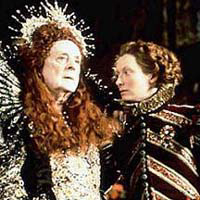 ANCIENT, GLITTERING & GAY A P.S. Reflection on Quentin Crisp by Guy Kettelhack |
|
Quentin was so profoundly laissez-faire; I think most people would be horrified if they ever allowed themselves an equivalent dip into acceptance of self, and of everything and everyone else. (Few of us are as ready to abandon ego so completely.) He truly did not want to change or alter anyone. This did not keep him from being a wonderful observer or critic—able in a scything glance to determine for himself what made a person, thing or event "work" or "not work." (Just read any of his sharply observed movie reviews.) In fact it's tempting to extrapolate from his vividly expressed loves and hates a sort of world view, one that we might imagine he implicitly wanted us to espouse. Not that he expected anyone to change on his account. All he ever did was say what he'd come to say; he had no personal investment in changing anything or anybody one iota from what or who each already and essentially was. It's an interesting conundrum in him: the most interesting of all, to me. You cannot sentimentalize or rationalize him in any way: he completely resists it. If we could imagine him having a religion, it would be one based on a complete belief in and acceptance of absolute idiosyncrasy. Another way of putting it: the absolute uniqueness of each of us. And yet—here's the real conundrum—somehow this was not for him a depressing business, not a sentence dooming us to isolation. Not sure why. I only know that with his absolute acceptance of everything as 'separate' came a capacity to enjoy the parade in front of his eyes with more delight and more immersion in what he saw than anyone else I've known. To find joy here—and a profound (paradoxical) sense of connection to the world—well, that's the trick he pulled off, and the ticket he implicitly offers us to take a similar awestruck ride through life. If he wanted us to be happy, it was surely by discovering joy in all the bleak business of finding ourselves incarnate. And we could. "The essence of happiness is its absoluteness." (I quote this ad nauseam, but it's always appropriate.) "It is automatically the state of being of those who live in the continuous present all over their bodies. No effort is required to define or even attain happiness, but enormous concentration is needed to abandon everything else." (Damned good definition of Buddhism to me.) Do you know the Yeats' poem "Lapis Lazuli"? It's always reminded me of Quentin (at least since I met him; I knew the poem before I knew him) —especially its final lines: Read Guy Kettelhack's contribution to "A Centennial Celebration" for Quentin Crisp here. Read is other article written for QCA, The Enigma of Denis Pratt. Read his article regarding Quentin Crisp at NightCharm. |
|
Copyright © 2006–2015 by Guy Kettelhack for the Quentin Crisp Archives. All rights reserved. Photo still from the movie Orlando. |

